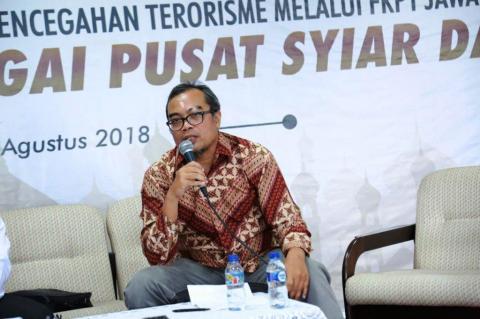Surabaya, NU Online
A former of terrorist prisoner, Kurnia Widodo was presented at the Dialogue on involvement of campus mosque administrator (takmir masjid) in the terrorism prevention, at Airlangga university, Surabaya, on Tuesday (8/28). He revealed the characteristics of the campus mosques that have been radicalized, as well as how to anticipate it.
Giving speech in front of 150 students who was administrators of campus mosque throughout Surabaya, Kurnia addressed that closed activities were not an absolute feature of the spread of radical and terror movements. According to him, recently a lot of activities to disseminate radicalism, actually were done openly.
“As an example, a religious lecture that was open for public at STT Telkom in 2015 presenting an ulema from Syiria. Lately he was known as ISIS supporter,” said Kurnia.
The main characteristic of radicalism dissemination in campus mosque, Kurnia continued was, if the religious lectures taught anti-Pancasila. Also treating outsider groups as infidel.
Another characteristic was, the activities carried out usually were named with the terms that were not familiar for most of Indonesian. “Such as daurah, mabit, and so on,” said Kurnia, he then mentioning another characteristic, namely physical exercises directed to militarism as well.
According to him, military exercises was held in the night. “Start from gymnastics, creeping up, and others. That is a sign of radicalism in the campus mosque environment,” he stressed.
To anticipate the spread of radicalism on campus, Kurnia, who graduated from ITB, majoring chemical engineering mentioned, campus authorities had to supervise the activities strictly. Every religious activities must be recorded and got permissions.
“Permission from rector must be there, if the event is big and there are speaker from outside, even foreigner, notification and permission from the police are have to,” explained Kurnia.
The man who was sentenced because his involvement in Cibiru bombing case, Bandung, also mentioned the importance of mentor in campus mosque activities by students. “Campus authorities can not freeing mosque administration without supervision and guidance,” he talked, finished the speech.
The event held as collaboration between National Contraterrorism Agency (BNPT) and Coordination Forum for Terrorism Prevention (FKPT) east Java. The others speakers who attended the event was FKPT secretary Nadjib Hamid, and co-founder Institute for Security and Strategic Studies (ISESS) Khairul Fahmi (S Hadi/Ibnu Nawawi)

















